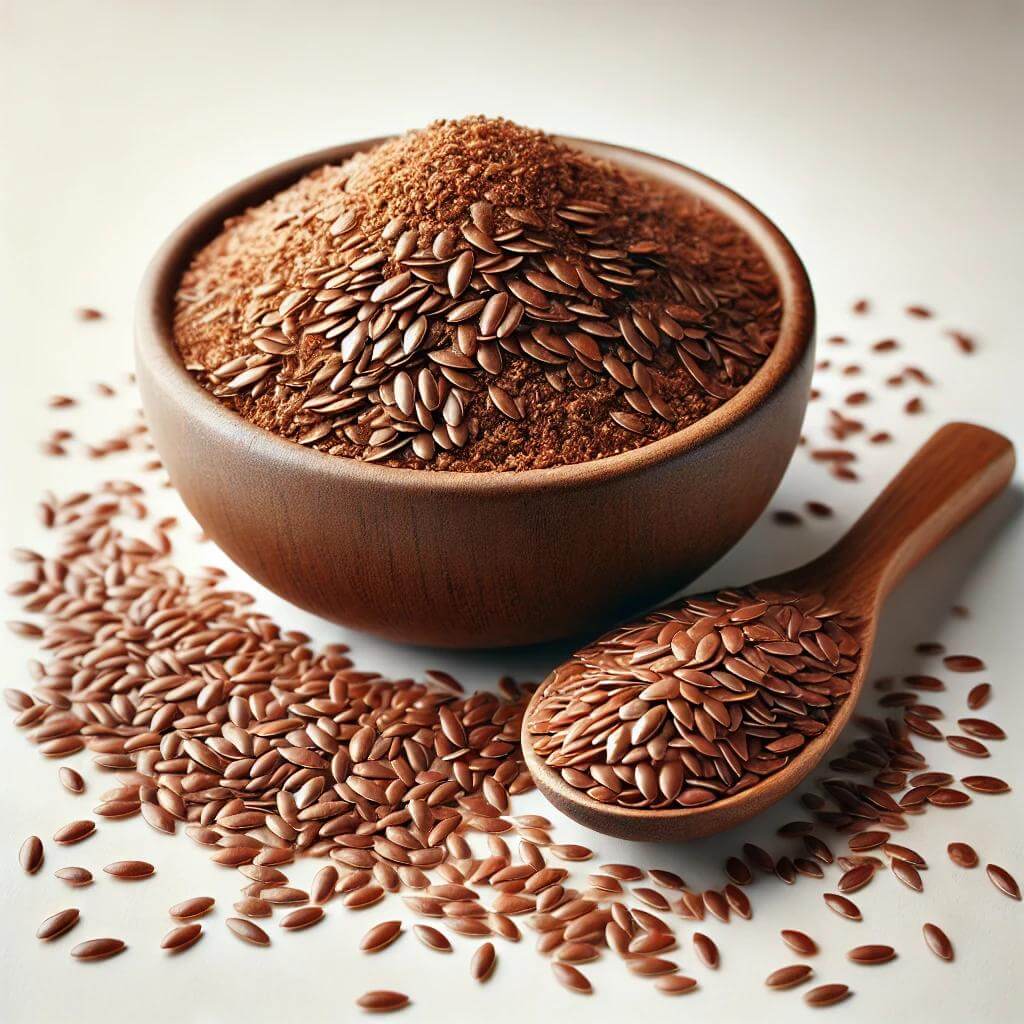Flax Seeds: The Tiny Superfood with Immense Health Benefits
Flax seeds, also known as linseeds, are small, golden-brown seeds that have been cultivated for thousands of years for their health benefits. Native to the Middle East, flax seeds have gained recognition worldwide as a superfood due to their high content of omega-3 fatty acids, fiber, and other essential nutrients. These tiny seeds pack a powerful nutritional punch, offering a wide range of health benefits that can improve overall well-being. In this article, we’ll explore why flax seeds are considered a superfood, delve into their health benefits, and provide tips on how to easily incorporate them into your daily diet.
Health Benefits of Flax Seeds
1. Rich Source of Omega-3 Fatty Acids
One of the most significant benefits of flax seeds is their high content of omega-3 fatty acids, particularly alpha-linolenic acid (ALA), which is essential for heart health and overall well-being.
- Supports Heart Health: Omega-3 fatty acids are known for their cardioprotective properties. ALA helps reduce inflammation, lower blood pressure, and decrease the risk of heart disease. Regular consumption of flax seeds can help maintain a healthy heart by reducing cholesterol levels and preventing arterial plaque buildup.
- Promotes Brain Health: Omega-3 fatty acids are crucial for brain function and development. They support cognitive health, improve memory, and may reduce the risk of neurodegenerative diseases such as Alzheimer’s.
- Anti-Inflammatory Effects: The ALA in flax seeds has potent anti-inflammatory properties, which can help reduce inflammation throughout the body, alleviating symptoms of chronic inflammatory conditions like arthritis.
2. High in Dietary Fiber
Flax seeds are an excellent source of both soluble and insoluble fiber, which are essential for digestive health and weight management.
- Improves Digestion: The soluble fiber in these seeds forms a gel-like substance in the digestive tract, which helps slow digestion and promote regular bowel movements. This can prevent constipation and support a healthy gut.
- Aids in Weight Management: Fiber-rich foods like flax seeds help you feel full longer, reducing overall calorie intake and aiding in weight management. The insoluble fiber adds bulk to the stool, promoting regularity and preventing overeating.
- Supports Blood Sugar Control: The fiber in flax seeds helps stabilize blood sugar levels by slowing the absorption of sugar into the bloodstream. This can be particularly beneficial for individuals with diabetes or those looking to maintain steady energy levels throughout the day.
3. Rich in Lignans
Flax seeds are one of the richest sources of lignans, plant compounds that have antioxidant and estrogenic properties.
- Antioxidant Power: Lignans have powerful antioxidant properties that help protect cells from oxidative damage caused by free radicals. This can reduce the risk of chronic diseases such as cancer and heart disease.
- Supports Hormonal Balance: Lignans have mild estrogenic effects, which can help balance hormone levels in the body. This is particularly beneficial for women during menopause, as lignans can help reduce symptoms such as hot flashes and night sweats.
- May Reduce Cancer Risk: Some studies suggest that the lignans in flax seeds may reduce the risk of hormone-related cancers, such as breast and prostate cancer, by inhibiting the growth of cancer cells.
4. Promotes Healthy Skin and Hair
The nutrients in flax seeds contribute to healthy skin and hair, making them a valuable addition to your beauty regimen.
- Hydrates Skin: The omega-3 fatty acids in these seeds help keep the skin hydrated, reducing dryness and improving skin elasticity. This can result in smoother, more radiant skin.
- Strengthens Hair: Flax seeds are rich in vitamin E and essential fatty acids, which nourish the scalp and hair follicles. This can lead to stronger, shinier hair and may reduce hair breakage and loss.
- Reduces Inflammation: The anti-inflammatory properties of flax seeds can help reduce skin conditions such as acne, eczema, and psoriasis. Regular consumption of these seeds can promote clearer, healthier skin.
5. Supports Digestive Health
Flax seeds are known for their digestive benefits, which can help maintain a healthy gut and prevent digestive disorders.
- Prebiotic Effects: The fiber in flax seeds acts as a prebiotic, feeding the beneficial bacteria in the gut. A healthy gut microbiome is essential for proper digestion, nutrient absorption, and overall health.
- Prevents Constipation: The high fiber content in these seeds helps prevent constipation by promoting regular bowel movements and softening the stool. This can relieve discomfort and improve digestive health.
- Reduces Digestive Inflammation: Flax seeds have soothing properties that can reduce inflammation in the digestive tract, helping to alleviate symptoms of conditions like irritable bowel syndrome (IBS) and diverticulitis.
6. Aids in Weight Management
Flax seeds can be a valuable tool for those looking to manage their weight or maintain a healthy weight.
- Increases Satiety: The fiber and healthy fats in these seeds help increase feelings of fullness, reducing the likelihood of overeating and helping with portion control.
- Boosts Metabolism: The omega-3 fatty acids in flax seeds may help boost metabolism, making it easier to burn calories and maintain a healthy weight.
- Reduces Fat Absorption: Some studies suggest that these seeds may reduce the absorption of dietary fat, further supporting weight loss efforts.
How to Incorporate Flax Seeds into Your Daily Diet
Flax seeds are incredibly versatile and can be easily added to a variety of dishes. Here are some practical ways to include flax seeds in your daily diet:
- Smoothies: Add a tablespoon of ground flax seeds to your morning smoothie for an extra boost of fiber and omega-3 fatty acids.
- Baking: Flax seeds can be used in baking to add texture and nutrition to bread, muffins, pancakes, and cookies. Use ground flax seeds as an egg substitute in vegan baking (1 tablespoon of ground flax seeds mixed with 3 tablespoons of water equals one egg).
- Oatmeal: Sprinkle ground flax seeds over your oatmeal or yogurt for added crunch and nutrition.
- Salads: Add whole or ground flax seeds to salads, salad dressings, or grain bowls for a nutty flavor and a nutritional boost.
- Soups and Stews: Stir ground flax seeds into soups, stews, or casseroles to thicken and enhance the nutritional content.
- Energy Bars: Incorporate flax seeds into homemade energy bars or protein balls for a nutritious and satisfying snack.
Potential Disadvantages of Flax Seeds
While flax seeds offer numerous health benefits, there are a few potential drawbacks to consider:
- Digestive Issues: In some individuals, consuming large amounts of flax seeds can cause digestive discomfort, including bloating, gas, and diarrhea. It’s important to start with small amounts and gradually increase intake.
- Potential for Allergic Reactions: Although rare, some people may have an allergic reaction to flax seeds, which can cause symptoms such as itching, swelling, and difficulty breathing. If you experience any of these symptoms, discontinue use and seek medical attention.
- Interference with Medications: Flax seeds have blood-thinning properties and may interfere with medications such as blood thinners or anticoagulants. Consult with a healthcare provider before adding flax seeds to your diet if you are on medication.
- Phytoestrogen Content: Flax seeds contain phytoestrogens, which are plant compounds that mimic the effects of estrogen in the body. While this can be beneficial for some, it may not be suitable for individuals with hormone-sensitive conditions.
Nutritional Values of Flax Seeds
| Nutrient | Amount per 100g | % Daily Value |
|---|---|---|
| Calories | 534 kcal | 27% |
| Carbohydrates | 28.9 g | 10% |
| Protein | 18.3 g | 36% |
| Fat | 42.2 g | 65% |
| Dietary Fiber | 27.3 g | 109% |
| Omega-3 Fatty Acids | 22.8 g | – |
| Vitamin B1 | 1.6 mg | 110% |
| Magnesium | 392 mg | 98% |
| Phosphorus | 642 mg | 64% |
| Iron | 5.7 mg | 32% |
Conclusion
Flax seeds are a true superfood, offering a wide array of health benefits that make them a valuable addition to any diet. From supporting heart health and digestion to promoting healthy skin and weight management, these tiny seeds pack a powerful nutritional punch. Whether you enjoy them in smoothies, baked goods, or salads, they are an easy and delicious way to boost your overall health. While there are a few potential drawbacks to consider, for most people, flax seeds are a safe and beneficial way to enhance health and vitality.
*Disclaimer: The information provided in this article is for educational and informational purposes only and should not be construed as health advice. The content is solely the personal opinion of the author and is not intended to be a substitute for professional medical advice, diagnosis, or treatment. Always seek the advice of your physician or other qualified health provider with any questions you may have regarding a medical condition or before starting any new diet or treatment. Read more




Post Comment